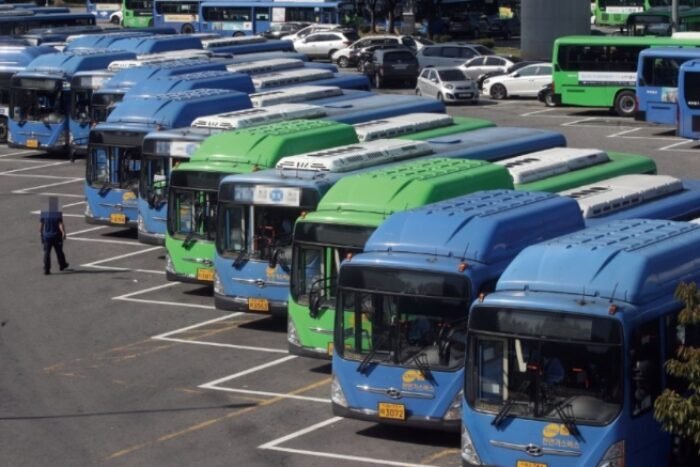Buses at a parking lot in Seoul
Seoul-based private equity firm Tcha Partners Asset Management Co., which owns 17 domestic quasi-public bus operators via four funds closed at 362 billion won ($262.3 million), plans to sell the companies at the largest deal in the number of local buses.
The PE manager will confirm a timeline for the sale procedures by the end of June and start a tender offer in the third quarter, according to banking sources on Monday.
Tcha owns the bus companies operating in the capital and other major cities including Incheon, Daejeon and Jeju. Under the quasi-pubic bus system, local governments back the companies when they make a loss thus guaranteeing financial stability, in exchange for controlling the companies’ routes.
“Domestic pension and retirement funds will favor the assets as the bus companies have a dominant market share and financial stability,” a banking industry official said. “We expect Korean mid-sized and large PE firms, major financial institutions and transportation-related companies to join the bid,” the official added.
Tcha bought 10 companies operating 950 buses in its three public mobility funds in 2019 and 2020 with a combined size of 162 billion won, including 52 billion won in equity. Tcha is considering putting the assets on the market first, which are expected to be the largest sale by the number of local buses.
The three vehicles, which own operators including Dong-A Transportation Co., BRTKorea Corp. and Samhwan Bus Co., will mature one after the other from the end of this year.
Tcha may also put the other seven companies running 650 buses within its fourth public mobility fund on the market. The investment firm bought the assets in 2021 with the 200 billion won fund, which includes 80 billion won in equity.
Singapore-based Keppel’s infrastructure division and private equity giant KKR & Co. have shown interest in the deal. But banking industry insiders expect selling the bus companies, partially backed by Korean citizens’ taxes, to foreign investors to be difficult.
Including the Seoul Metropolitan Government, major municipalities in Korea have set up criteria for foreign capital’s involvement in the domestic quasi-public bus system and strengthened oversight of foreign investors’ ownership via funds since 2022.
By Jun-Ho Cha
chacha@hankyung.com
Jihyun Kim edited this article.


Leave a Reply